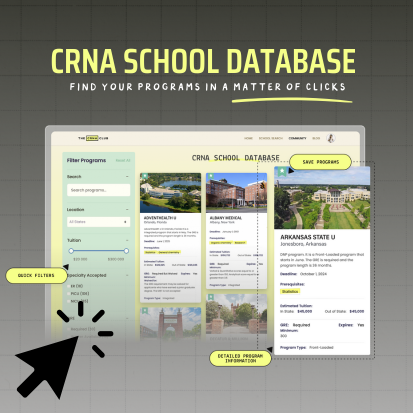If you’re gearing up to start your 36-ish month journey to becoming a CRNA, you’re probably wondering what all the fuss is about when it comes to the didactic phase. Is it really that intense? (Spoiler: yeah, pretty much.) As someone who’s walked through the fire and just wrapped up my second semester in a front-loaded program, I figured I’d share some real talk about what makes the didactic phase so challenging—and how to survive it with your sanity (mostly) intact! Here’s what makes the didactic phase so tough:
The Overwhelming Volume of Content
Ever heard the phrase “like drinking from a firehose”? That’s exactly what the didactic phase feels like—every single day. If you’re in a front-loaded program like mine, your first semesters are packed with core classes: anatomy, physiology, pharmacology, anesthetic pharmacology—plus research, simulations, ethics, statistics, etc. It’s a lot, and 24 hours never feels like enough.
But hey, you’ll survive (with just a few tears 😅). Didactic is tough for a reason, but you can do hard things. Your program believed in you for a reason.
Tips to Stay Sane:
Plan your days (hour by hour if needed)
Staying organized is key. I scheduled every hour to stay on track! Find a system that works for you and stick with it.
Discipline > Motivation
Making a schedule is easy—sticking to it is the hard part. Falling behind can snowball fast in the didactic phase! Be ready to make sacrifices, like skipping that Friday night out or missing out on those concerts. It’s temporary, but it’s worth it in the end!
Protect your mental health!
The most important tip: build in time for rest in your schedule! Yes, CRNA school is your life right now, but it doesn’t have to all be about studying! Burnout is so real in CRNA school; give yourself breaks. Maybe you don’t study past 4pm on Saturdays or make time to work out daily. Whatever it is, prioritize yourself!
Time Management & Lifestyle Adjustments
Let’s be real: during the didactic phase, the days never feel long enough. Between trying to understand complex material and reviewing it until it sticks, half your day is gone before you know it. And on top of that—you’re still a whole human being with a life outside of school. Crazy, right? 😅You can’t add more hours to the day—but you can take control of how you spend them. Be intentional. Protect your time. And give yourself permission to let go of the little things so you can focus on the big ones. Being a CRNA student is a full-time job, and to stay afloat, you’ve got to protect your time like it’s gold. Here’s how:
Streamline the Non-School Stuff
Batch your chores.
Do laundry, clean, or run errands on one day (Ok Sunday Resets! 😎) instead of spreading them across the week.
Automate your life.
Bills? Auto-pay them. Groceries? Schedule pick-up or delivery. Take the mental load off.
Ask for help.
Let your partner, family, or friends support you. Whether it’s walking the dog or picking up groceries—it matters. You don’t have to do it all alone!
Meal prep = time back.
Making 5 dinners on Sunday saves you hours of cooking + dishes during the week. You’ll thank yourself every night you’re not scrubbing pots after reviewing 1000 pharmacology flash cards.
The Learning & the Unlearning
One of the hardest parts of didactic? Relearning how to learn. After being out of undergrad for over a decade, I had my old ways—print out the PowerPoints, scribble notes, take exams on Scantrons (yes, really 😂). Fast forward to CRNA school: everything’s digital, fast-paced, and way more self-directed. Learning how to use an iPad for notes was a curveball, but the biggest challenge wasn’t tech—it was unlearning the old habits that no longer served me. CRNA school isn’t undergrad. There are no hand-holding study guides or weekly quizzes. It’s “teach yourself and hope you crush the 4 exams that determine your grade.” 🙃
The truth? Success here isn’t about your background—it’s about adaptability.
Here’s how I adapted:
Going Digital Changed Everything
Notability was my best friend. Using an app like Notability or Goodnotes kept all my notes, lectures, and PDFs in one organized space. The best part? I could search my handwritten notes. So when I needed to find every mention of “alpha-2 agonist,” boom – there it was. No more flipping through binders. No more wondering where I scribbled that one explanation. The bottom line is to find a digital tool that fits your style and run with it. It saves time, keeps you organized, and makes studying less chaotic.
Build a routine around active learning!
Rereading your notes won’t cut it in CRNA school. I had to rewire how I studied. I started quizzing myself daily, teaching concepts out loud, and explaining pharmacology to anyone (or anything) that would listen—yes, even my dogs! 🐶I also joined a study group early on, and it made all the difference. Hearing how others explained difficult concepts gave me new perspectives—and helped catch my blind spots.
Diversify Your Learning Resources
Professors are great, but they can’t spoon-feed you everything. Don’t get me wrong, they should always be your #1 resource to the material! But, sometimes I just needed to hear a concept explained in a different way for it to click. That’s when I turned to YouTube videos, podcasts, and even alternative textbooks. Some days, a 10-minute visual explanation taught me more than hours of staring at my notes. Being adaptable means knowing when to seek out other resources to make things stick in a way that you understand best.
Surviving didactic is absolutely possible—but it takes more than just hard work. It requires a total shift in mindset, routine, and lifestyle. What many don’t realize before starting CRNA school is that it doesn’t just change how you study—it changes everything. These strategies helped me navigate the chaos, and while I wish I had understood this earlier, I hope they help you feel more prepared. No matter where you are in your journey, just know this: with the right adjustments, you can make it through—and come out stronger on the other side.
Ready for more tips on how to get into CRNA school? Check out our community here!




